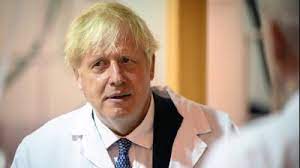LONDON: The first votes in the crowded, unpredictable, and divisive race to succeed Boris Johnson will be cast this week, with the announcement of Britain’s new prime minister expected on September 5.
To date, 11 candidates have entered the race to succeed Johnson as prime minister and leader of the dominant Conservative Party. Johnson resigned following a dramatic uprising by his own lawmakers and ministers following a number of scandals.

To even advance to the first round of voting on Wednesday, according to the 1922 committee of Conservative MPs, contenders must receive at least 20 nominations from the party’s 358 legislators.
Before the subsequent vote on Thursday, anyone who received less than 30 votes will be disqualified. In order to gain the support of their fellow candidates, nearly all of the candidates have made bold tax cut promises.
Graham Brady, the committee’s chair, stated, “I am very keen we get this concluded as smoothly, cleanly, and promptly as possible.”
Before the Conservative Party’s members, who number fewer than 200,000, cast their postal ballots over the summer, the field will be narrowed down by lawmakers to a final two contenders.
According to a poll conducted on Monday for the Conservative Home website, Rishi Sunak, whose resignation as finance minister helped bring down the government, is the most well-liked among members, followed by equalities minister Kemi Badenoch and former defence minister Penny Mordaunt.
Brady observed that the field appeared to be fairly large and that the competition was lively. “I hope we will have a very productive debate about the future of the Conservative Party, as well as a really good opportunity for a proper, healthy, constructive contest,” the candidate said.
The struggle for the top position follows one of the most turbulent periods in contemporary British political history, during which more than 50 government ministers and aides resigned, criticising Johnson’s moral character, honesty, and lack of candour.
The new leader will also need to stem the tide of dwindling Conservative support. According to a Savanta ComRes poll released on Monday, the opposition Labour Party has its largest poll advantage since 2013 with 43 percent to the Conservatives’ 28 percent.
The race for succession has already taken a personal turn.
Another candidate, former finance minister Sajid Javid, criticised what he called “poisonous gossip” and “attack memos” made over the weekend by some colleagues.
“These people who are here just because they enjoy the game, they are in the wrong place,” he said. “This isn’t the ‘House of Cards’ or the ‘Game of Thrones’.” “Now is the time to come together, not to split apart.”
With almost every candidate promising to lower personal or business taxes, the tax debate was quickly moving to the forefront of the race.
Foreign Secretary Liz Truss outlined her platform, promising to reverse the recent increase in National Insurance contributions and hinting at a reduction in corporation tax. Truss has held ministerial positions in a number of government agencies, including trade, justice, and the treasury.


